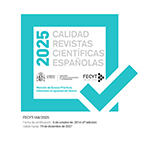La tarea crítica: interconexiones entre lenguaje, deseo y subjetividad
Resumen
El presente trabajo quiere ensayar un ejercicio de reflexividad en relación ala tarea crítica, con el objetivo último de incorporar aunque sea parcialmente la dimensión de “lo no sabido, de lo no pensado pera actuado a través de la acción crítica”. Espacio necesario para que éste no sea un espacio institucionalizador a un ejercicio de dominación en sí mismo. Se parte de la idea que la racionalidad como lógica discursiva y como herencia de la modernidad, ocupa todavía demasiado espacio dentro de la tarea crítica. Espacio, que o nuestro modo de ver, ahoga las posibilidades de cambio de segundo orden que habitan dicha crítica. Para realizar el trayecto de este ejercicio de reflexividad se ha trabajado con bastantes fuentes provenientes de la teoría crítico feminista post-estructuralista (Horaway, Butler, Braidotti, Keller, Birulés, etc.) y se ha ejemplificado el espacio de la crítica a través del socioconstruccionismo, pero solo como posibilidad disciplinar ya que nuestro espacio es la Psicología. El objeto de reflexión sin embargo alcanza el “magma” de teorías críticas inscritas en el postestructuralismo. El objetivo es incrementar en algún grado la conciencia alrededor de una parte oscura de la tarea crítico con el fin de aumentar su potencial de transformación. Para el ejercicio se han destacado algunas cuestiones concretas: el giro hacia la construcción social, el sujeto de deseo a través del discurso, la doble responsabilidad de la crítica, sobre sí y sobre el mundo, para finalmente sugerir la toma en cuenta de algunas herramientas conceptuales que, a nuestra modo de ver, podrían ayudar a socavar la herencia racionalista que todavía habita la tarea crítica, Estas son: la relación entre el imaginario y el deseo, la experiencia como tensión, la subjetividad como vehículo de poder y resistencia y la reflexividad.Descargas
Descarga artículo
Licencia
La revista Política y Sociedad, para fomentar el intercambio global del conocimiento, facilita el acceso sin restricciones a sus contenidos desde el momento de su publicación en la presente edición electrónica, y por eso es una revista de acceso abierto. Los originales publicados en esta revista son propiedad de la Universidad Complutense de Madrid y es obligatorio citar su procedencia en cualquier reproducción total o parcial. Todos los contenidos se distribuyen bajo una licencia de uso y distribución Creative Commons Reconocimiento 4.0 (CC BY 4.0). Esta circunstancia ha de hacerse constar expresamente de esta forma cuando sea necesario. Puede consultar la versión informativa y el texto legal de la licencia.











